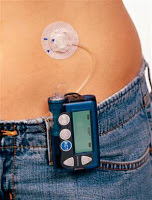In March 2011, I wrote about
taking the leap to an Insulin Pump. I decided to revamp and update this old post because I've been asked more questions about what it's like to use one and be attached to one.(If you are not sure about how an insulin pump works or what it even is, go to this
link.)

I have been using an insulin pump for 5 years. The first one I had was the Animas 2020. In 2014, I upgraded to the Animas Vibe, which can be used with a
Continuous Glucose Monitoring (CGM) System.
At the present time, I don't use the CGM bit because my team decided to keep things simple and apply for the upgrade first. I am in the process of applying for it through the Long Term Illness Scheme now.
Life before the Pump.
Before pumping, I was on a rapid-acting insulin called NovoRapid which I took with my meals and snacks or if I needed to correct a high blood sugar. I also took a long acting insulin, Lantus which I initially took once daily at bedtime but then for a while I took it twice daily; both morning and evening. I used the Insulin Pens which meant this added up to at least 5 injections daily or Multiple Daily Injections (MDI).
I measured my carb intake and I tested my blood sugars before meals and two hours afterwards to make sure that I was taking the correct amount of insulin for that meal.
I was frustrated about not being as in control of my diabetes as I should be for the amount of effort I was putting in.
Living with an Insulin Pump.
I did a trial period on the insulin pump before going “live”. This means that I would practice attaching it but not using insulin just yet. I used a saline and water solution instead of insulin. The purpose of this was to become less afraid of it and to become familiar with the button pressing and more importantly to figure out where and how I was going to wear it.
During the trial period, I wanted to fling the thing at the nearest wall – the tubing was always in the way. I had some doubts about whether or not I would be able to do this.
But I knew that if it didn't work out I could go back to MDI. I adopted a “if you never try, you never know” attitude. Plus, there were so many pump users in the world raving about its benefits that I had to believe the pros were going to outweigh the cons.
Once I went “live” this all changed. I adapted to the button pushing in about a week, in about two weeks I was comfortable with the infusion set change every three days and within six months it all clicked together.
The tubing hardly ever gets in the way and when it does it's an easy problem to solve. I have accidentally ripped out a cannula (the plastic needle bit that stays under the skin delivering the insulin) only once in six years. That's not bad going.
The highlights for me are;
- Convenience.
I never realised how uncomfortable I was injecting insulin in public until I didn't have to any more. Now when I take my insulin, people think I'm checking my text messages. I don't have to flash flesh to do an injection either, removing any chance there may be of an awkward glance from some stranger across the room!
If I need to take extra insulin to correct high blood sugars, my insulin pump is always on my hip to do so, I don't have to move from my comfy spot on the couch in the evening. And I don't have to stick myself either.
- Pump memory
The pump has a "history" feature so if I'm not sure if or when I took my last bolus dose and when I last changed my needle set.
- Adapt to unforeseen situations.
I can be a bit more spontaneous without the fear of the subsequent hypos. I can chose to reduce my background (basal) insulin if my day becomes insane and I end up running around like a headless chicken. Or I can chose to increase my basal if I'm sick or having a very lazy day (AS IF!!!).
- Manage exercise.
Exercise is definitely more manageable and I don't have to stuff my face so much afterwards. When I used background insulin once I had taken it I had to live with the effects of it for 12 to 24 hours. My only option to avoid hypos for those hours was to eat to feed that insulin. The insulin pump allows me to reprogramme my background insulin hourly if needed or temporarily.
No one ever sees my insulin pump. And not because I have it hidden - they just don't notice it. When they do they just assume it's a mobile phone and pay no attention to it.
And life with diabetes became just a little bit simpler by using only one type of insulin. I feel like my insulin pump gives me more of the control of my diabetes, instead of being a slave to insulin.
Using an insulin pump is not for everybody. It is a serious commitment to figure out background insulin rates and to constantly adapt to how your diabetes evolves and changes.
But in my case, I hope to never go back to injections.











